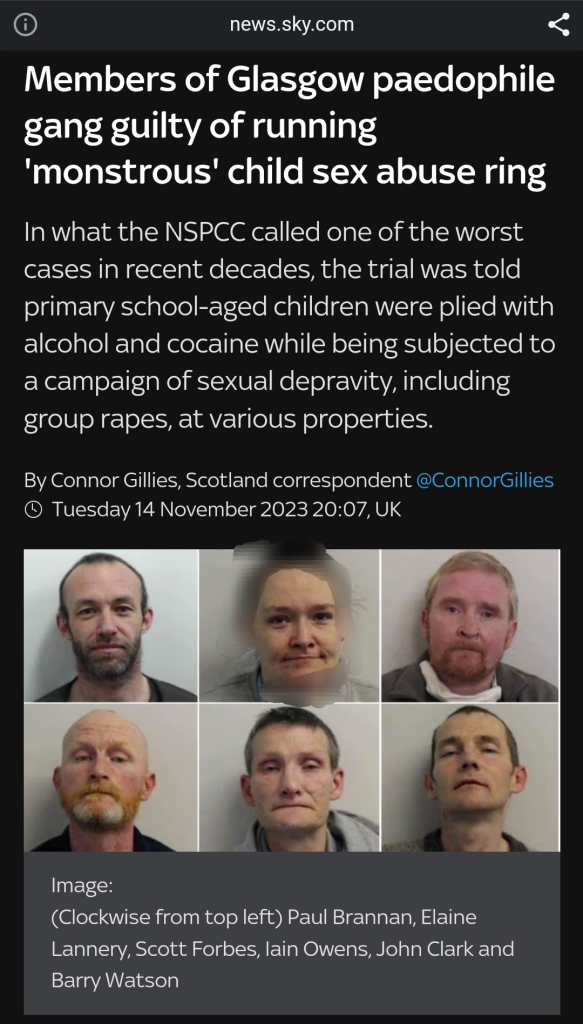Child sexual abuse (CSA) in England and Wales is a harrowing societal issue. Its complexities are compounded when ethnicity is brought into the conversation, often as part of politically charged narratives. Recent data from the Vulnerability Knowledge and Practice Programme (VKPP) and the Hydrant Programme provides crucial insights into CSA and its relationship with ethnicity. However, this evidence challenges claims made by figures like Elon Musk and political entities such as Reform UK, who have drawn attention to specific ethnic groups in relation to grooming gangs, perpetuating divisive and misleading stereotypes.
The following critically examines these accusations in light of the data, contextualising the ethnicity dimension of CSA and emphasising the broader realities.
Accusations by Reform UK and Elon Musk

Reform UK, a right-wing political party, and influential voices like Elon Musk have focused on historical cases involving predominantly Pakistani grooming gangs. This rhetoric suggests that CSA is a problem unique to, or predominantly perpetrated by, specific ethnic minority groups. Such claims have been amplified on social media and in public discourse, fostering the impression that CSA and group-based child sexual exploitation are disproportionately linked to Asian, particularly Pakistani, perpetrators.
While these allegations stem from high-profile cases like those in Rotherham, Rochdale, and Telford, they fail to account for the broader data and context surrounding CSA. This selective focus distorts the reality of CSA, which spans all ethnic groups and socio-economic backgrounds.
The real truth that Elon and Tommy and all their cronies don’t want you to know!
— JonnyUtd (@Fx1Jonny) January 13, 2025
pic.twitter.com/31Y6aHIZDc
The Data: Challenging the Narrative
Recent reports from the VKPP and Hydrant Programme, which collate data from all police forces in England and Wales, directly contradict these claims. Key findings include:
- Ethnicity of Perpetrators in Group-Based Abuse:
- 85% of suspects in group-based CSA are white, compared with 7% Asian and 5% black.
- These proportions align with general population demographics, where 82% are white, 9% Asian, and 4% black.
- Victim Demographics:
- 85% of victims of group-based CSA are white, slightly exceeding their population proportion.
- Children from mixed/other ethnicities are over-represented among victims, making up 8% of cases despite comprising 5% of the population.
These figures debunk the idea that CSA is a problem unique to any one ethnic group, instead demonstrating that such crimes occur across all demographics.
Historical Cases and Broader Trends
The high-profile cases cited by Reform UK and Elon Musk were indeed egregious failures of local authorities to protect victims. In Rotherham, for example, over 1,400 children were abused between 1997 and 2013 by predominantly Pakistani-heritage men. However, extrapolating from these cases to suggest that CSA is predominantly linked to Pakistani or Asian men ignores the broader statistical evidence.
- Group-Based Abuse Proportion: Less than 5% of total CSA cases in 2022 and 2023 were categorised as group-based.
- Predominance of White Offenders: The majority of group-based offenders are white, as reflected in the data.
While recognising the need for accountability in handling historical cases, the broader picture does not support claims of ethnic exclusivity or predominance.

Understanding Biases in Reporting and Public Perception
- Media Amplification:
- High-profile cases involving minority offenders often receive disproportionate media coverage, reinforcing stereotypes.
- White offenders, who constitute the vast majority of perpetrators, receive comparatively less media attention, skewing public perception.
- Underreporting Among Minority Communities:
- Victims from minority and migrant backgrounds are less likely to report abuse due to stigma, mistrust in authorities, and fear of cultural repercussions.
- This underreporting further obscures the true scope of abuse within these communities.
- Political Motivations:
- Reform UK and similar entities use these narratives to advance anti-immigration agendas, conflating CSA with broader cultural and societal tensions.
Ethnicity and the Realities of CSA
The focus on ethnicity in CSA often diverts attention from more pressing systemic issues:
- Institutional Failures:
- Many CSA cases, including those involving white offenders, highlight systemic failures in law enforcement and social services.
- Historical failures in addressing abuse are not unique to cases involving minority perpetrators but are symptomatic of broader inadequacies.
- Gender Dynamics:
- The vast majority of perpetrators (82%) are male, irrespective of ethnicity.
- Female victims account for 79% of CSA cases, demonstrating that gender dynamics are far more significant than ethnicity in understanding abuse patterns.
- Intersectionality:
- Victims from minority groups, migrant communities, and disadvantaged socio-economic backgrounds face compounded vulnerabilities, making them less visible in reported data.
The Importance of Accurate Narratives
The perpetuation of ethnic stereotypes in CSA discussions is harmful for several reasons:
- Distracts from Systemic Solutions:
- Focusing on ethnicity diverts attention from systemic issues like underfunded child protection services, inadequate police training, and societal stigma around CSA.
- Hinders Community Trust:
- Misleading narratives erode trust between minority communities and law enforcement, further discouraging victims from reporting abuse.
- Reinforces Prejudice:
- Linking CSA to specific ethnic groups fosters division and discrimination, perpetuating societal inequality.
A Data-Driven Way Forward
To combat CSA effectively and inclusively, a data-driven approach is essential:
- Improved Data Collection:
- Authorities must standardise data recording to ensure ethnicity and other relevant factors are consistently captured.
- Culturally Sensitive Engagement:
- Building trust with minority communities through culturally sensitive outreach and victim support services can help address underreporting.
- Focus on Systemic Reforms:
- Enhancing child protection services, improving law enforcement training, and addressing institutional shortcomings should take precedence over divisive rhetoric.
Conclusion
The data unequivocally contradicts claims by Elon Musk and Reform UK that CSA is predominantly or uniquely tied to specific ethnic groups. Instead, it reveals that child sexual abuse is a pervasive societal issue affecting all demographics. Misleading narratives not only distort public understanding but also hinder efforts to address CSA comprehensively. By focusing on evidence-based solutions and fostering inclusive dialogue, society can move towards more effective prevention, protection, and justice for all victims, irrespective of their background.







